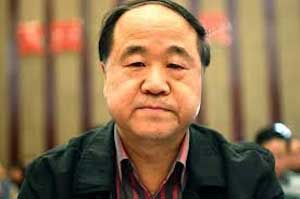

Mo Yan: Art out spoken.
Abbas Panakkal

Even now the real ambiguity of the hallucinatory realism is haunting my mind, which always doubts others as the replica of the hidden mind and a hard metaphor of life. Hallucinatory realism is a motivation for Mo Yan’s Nobel Prize in literature. The real name of the Chinese Nobel laureate is Guan Moye, Mo Yan is his pen name, which means "don't speak" in Chinese and there is revolutionary intention behind the selection of the name that was a revenge to the difficulties of freedom of expression.
Mo Yan was a born revolutionist, who always hard worked for a better change. When his father and mother sensed his motive, they seriously warned him not to speak out in public about the revolutionary ideas, for the revolutionary political situation was growing up along with him. Mo Yan just himself accepted the pen name that itself spoke out the hard talks of the time. The pen name also related to the subject matter of Mo Yan's writings, which reinterpret Chinese political and gender history.
Mo Yan, the first Chinese citizen who won the Nobel Prize in Literature, has created new hope in contemporary Chinese writers. Mo Yan was born in 1955, in Shandong province to a family of farmers, in Dalan Township which he fictionalized in his novels as "Northeast Township" of Gaomi County. He left school during the Cultural Revolution to work in a factory that produced petroleum and just after the revolution he joined the Peoples Liberation Army. The 57-year-old writer is known for his depiction of Chinese rural life from early 1911 revolution, Japan's invasion to Cultural Revolution.
Mo Yan began his career as a writer in reformation time composing number of short stories and novels in Chinese. His first novel was Falling Rain on a Spring Night, published in 1981, when he was a soldier. Later he was promoted to teacher post at the Department of Literature in the PLA Academy of Art and Literature, where he could publish A Transparent Radish (1984), but he continued his study and obtained a master's degree in Literature in year 1991. Mo Yan’s novel Red Sorghum first came to wide attention on the big screen both at home and abroad in 1987. The film was directed by Jiang Yimou and marked the acting debut of Gong Li.
Mo Yan wrote his latest novel Life and Death Are Wearing Me Out in only 42 days composing the more than 500,000 characters contained in the original manuscript on traditional Chinese paper using only ink and a writing brush. Life and Death Are Wearing Me Out is the story of a rapacious landlord, reincarnated in the form of various animals during the Chinese land reform movement. The republic of wine a satirical novel, which depicts the rapport between Chinese and their attachment to food and culture and comments on corruption and unrestrained behavior.
A sparkling comment came from Chinese poet that Mo Yan’s success was not only the success of Chinese literature but it was also a reflection of country’s overall development in economy and culture. Yes China was planning well in the foray to the apex of world order, where they never allowed the literature or art lag behind.
China's splendid ancient literature, which extends to thousands of years, has been widely acknowledged across the world. However, the contemporary literature failed to get enough recognition from outside the country. In spite of this, some other Chinese poets have still the opinion that Nobel Prize is not the sole standard to judge the achievements of a writer.
Now the language is cursed as a barrier for a small percentage of Chinese literature has been translated into foreign languages. It was another genuine reason that most of the translators could not carry the real spirit of the literature, in addition to language skills. Translation requires high-level comprehension and interpretation of culture and art. Here what was lost in translation was real literature because it was hard to produce a translation that fully reserved the aesthetic sense of the original version for not being well flavored with real beauty the both languages. Howard Goldblatt, who translated Mo Yan to English is the man who just introduced him to English readers keeping the essence of literature and culture.
And another notable factor is that this Chinese Nobel laureate is not an anti Chinese. It is very important to quote his words here: "Many criticized me for my close relations with the 'Ti Zhi' (the Chinese word refers to governmental departments or government-related sectors) and the Communist Party of China. But actually, many of my critics are working in the "Ti Zhi" or they themselves are Party members. The political stance doesn't contradict with the Nobel Prize," he stressed. “If you have read my books, you should know that my attacks on the dark sides of society are very severe and harsh,"
Mo Yan combines hallucinatory realism with folk tales, which is more appealing to the taste of Western readers. The Academy’s press release proudly announced the specialty of his style and diction with which hallucinatory realism merged folk tales and history.

